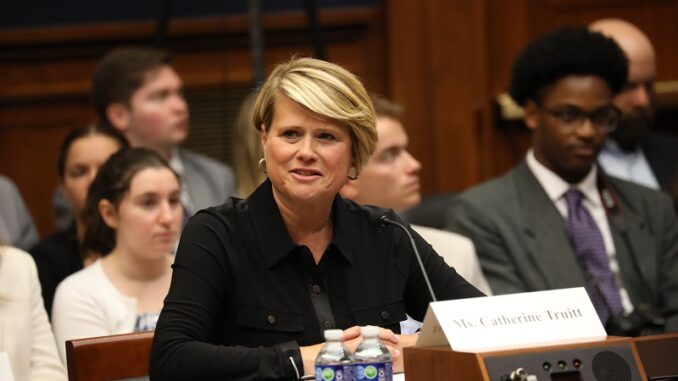
RALEIGH — Appearing before a congressional committee on July 26, State Superintendent Catherine Truitt described some successes the state has had when dealing with learning loss and educational pandemic recovery.
Truitt gave testimony before the U.S. House Subcommittee on Early Childhood, Elementary, and Secondary Education as part of a panel on “Generational Learning Loss: How pandemic school closures hurt students.”
In addition to Truitt, other panel members testifying included Nat Malkus, senior fellow and deputy director of education policy studies at American Enterprise Institute; Mary-Patricia Wray, parent; and Derrell Bradford, president of 50CAN: the 50-State Campaign for Achievement Now.
At the onset of the hearing, various lawmakers asked panel members about the impact of school closures and the role of teachers unions in keeping schools closed.
Committee Chair Rep. Aaron Bean (R-FL) asked Bradford about “the truth” of teachers unions claiming they had pushed to reopen schools. Bradford responded with “that depends on the definition of true,” before offering Chicago schools as an example where trying to reopen schools was criticized as “sexism, misogyny and racism,” and where teachers used “coffins” during protests.
Wray called school closures the “least American decision we could make in generations,” while Malkus brought up the point some private schools and countries that stayed open or that opened earlier seem to have had a lesser degree of learning loss issues.
Following those remarks, some Democratic members of the committee complained the hearing wasn’t about solutions but political rhetoric.
In her prepared remarks, Truitt outlined ordering the creation of the Office of Learning Recovery (OLR) to effectively manage the millions in federal relief dollars received by the state.
“Knowing of this influx of federal funds about to flow into our state and recognizing, as a parent of three children, how detrimental school closures were for our students, I immediately launched the Office of Learning Recovery and Acceleration in February 2021,” Truitt said. “This Office remains one of the first, if not the only, of its kind. When the massive influx of federal funding did come pouring into North Carolina, we were as prepared as we could be.
“My agency was able to provide local education leaders with an office dedicated to recovery and rooted in research and data,” said Truitt. “This was vital because many of our 115 school districts and more than 200 charter schools did not have the central office support or bandwidth to take on the massive exercise in planning and compliance that would be required with ESSER III.”
Truitt went on to talk about the “2022 Lost Instructional Time Report” which she said was used as a benchmark to monitor progress and ensure North Carolina’s students continued to accelerate, our agency produced a second report in April of this year.”
She also said the 2023 report “detailed the significant strides students made in the 2021-22 school year,” and that the “strongest gains were made in middle school math.”
The OLR, part of Truitt’s strategic plan called Operation Polaris, has provided data and white papers on learning loss including a 2022 report that showed K-12 academic achievement in North Carolina fell behind by between two and 15 months across various subjects due to lost instruction time and remote learning of students because of pandemic school closures. Test scores reported later in the year showed students were making moderate gains but achievement in some subjects still had not returned to prepandemic levels.
Truitt fielded questions from various committee members including Reps. Virginia Foxx (R-NC) and Bobby Scott (D-Virginia).
Foxx prefaced her question by stating that “arguments from the left” included spending even more money, but then noted North Carolina had been successful with existing resources.
“Do we need billions of federal dollars to fix this?” Foxx asked Truitt.
Truitt replied that the OLR was created to be “good stewards” of federal dollars and that most money went to the school districts in the state. She said for rural districts with small staff, dealing with the funding was “daunting” for them and that the OLR was “very unique” and in a short time frame had provided those districts with data they needed to make decisions.
Scott praised Truitt when it came time to ask his set of questions.
“You obviously weren’t surprised to find students with a reduced academic achievement when they
weren’t in school, but rather than complaining about it and blaming people you focused on actually doing something about it,” Scott said to Truitt. “It sounds like you started with getting data. Can you tell me why it was important to get student-level data?”
“In North Carolina, the 10% holdback from ESSER III was, by law, able to be appropriated by our General Assembly,” said Truitt. “And so we wanted to be able to provide them, as well as districts who — again, got 90% of those funds — the information that they needed to best serve individual students.”
She added taking a “scattershot approach” in her opinion was “not an option.”
“So, in doing a population study, which means that we looked at the learning loss of every single student, we were able to determine by student and by subgroup which subject suffered the most,” Truitt explained. She went on to say the OLR was then able to recommend where the district might best spend its funding.
Scott asked what resources, programs or interventions were recommended the most. Truitt responded with examples of Summer Bridge Academies and Math boot camps, statewide high-dosage tutoring efforts, as well as teacher professional development.
“Based on what is working and what might not be working, what recommendations can you suggest outside of the pandemic to improve education?” Scott asked Truitt.
“I would say that we need to not run away from accountability; that standardized testing lets us know where we are falling short with which subgroups,” replied Truitt. “Had it not been for No Child Left Behind, we wouldn’t know that our black and brown students were experiencing the kinds of gaps that they were.
“So, in a time where some states are running away from accountability, North Carolina is running toward accountability. But we need to include other measures of accountability aside from standardized tests,” Truitt said. “And that means things like chronic absenteeism. If children are not at school, they cannot
learn.
“We also need to be holding our districts accountable for whether or not students are participating in Career Technical Education so that we can once and for all get rid of the narrative that the only Pathway to the middle class is with the four-year college residential degree.”



